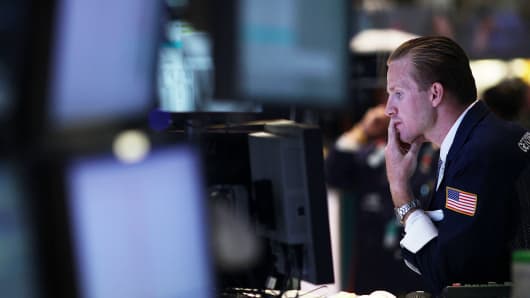With little else to distract traders, the latest developments in the "fiscal cliff" talks are likely to be the biggest driver for Friday's markets, especially ahead of the weekend.
Stocks slipped Thursday amid an apparent lack of progress in Washington in the talks. The Dow fell 74 to 13,170, and the S&P 500 was down 9 at 1419.
Economic data Friday includes consumer prices at 8:30 a.m. ET and industrial production at 9:15 a.m.
Bond yields continued to rise, as they have since Wednesday's announcement by the Fed that it will buy $45 billion in Treasurys per month, including medium duration securities. The 10-year yield reached 1.74 percent in late afternoon trading Thursday.
The Fed Wednesday also took the unusual step of providing goal posts for when it could reverse its zero interest-rate policy. One of its markers is a 6.5 percent unemployment rate, and the other is inflation at 2.5 percent. Some traders have bet unemployment may recover faster than the Fed believes, and they viewed the targets as hawkish.
Citigroup surveyed investors after the Fed announcement and found that half the bond investors it talked to were neutral, and shorts outnumbered longs by a high 20 percent, the opposite of last month. Citigroup also said the investors it surveyed, including hedge funds, banks, pension fund and money managers, mostly expect higher rates in the next three months.
More than 50 percent saw the 10-year yielding 2 percent in three months, and another 10 percent saw the 10-year yield at 2.25 percent. Only 10 percent saw rates lower, with the 10-year at 1.5 percent.
The Citigroup survey also found an even split among investors on whether Congress comes to an agreement on a tax and spending deal. The survey also found investors more bullish on equities.
House Speaker John Boehner was meeting with President Barack Obama at the White House early Thursday evening.
"I think we're in a kind of limbo here, waiting for some outcome," said Jack Ablin, CIO at BMO Private Bank.
"The risks are policy makers don't behave themselves and the market gets upset," said Ablin. The economy will hit the so-called fiscal cliff if Congress fails to halt the expiration of tax breaks and the onset of automatic spending cuts that take place starting Jan. 1.
"Even if they don't reach an agreement, it's not the apocalypse if we hit January third or first, and there's no agreement," he said. "It's like our economy is sitting in a pot of water. Come January 1, the heat is turned on, but it will still take a while to reach the boiling point. I think the pressure is certainly going to be on if there's no agreement by year-end. I think it's going to create a lot of nervousness and tenuous trading."
Ablin said he does not expect to see a major Santa rally this year though the market has drifted higher since Nov. 16. The S&P 500 is up 5.7 percent since then, and is now up 12.8 percent for the year. He said the market will focus on the unknowns, including the capital gains tax, which is likely to revert to 20 percent and 23.8 percent for the wealthiest investors, from 15 percent.
"The math on capital gains is skewed toward selling," he said. "I think it's more of a downward bias than anything else. Santa is going to be trumped by capital gains."



